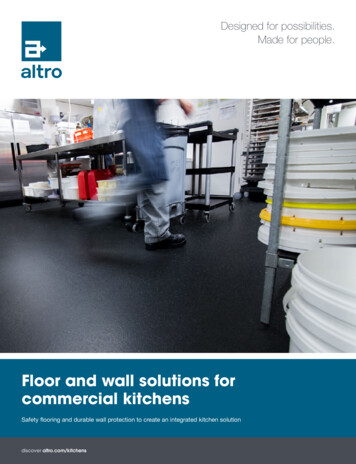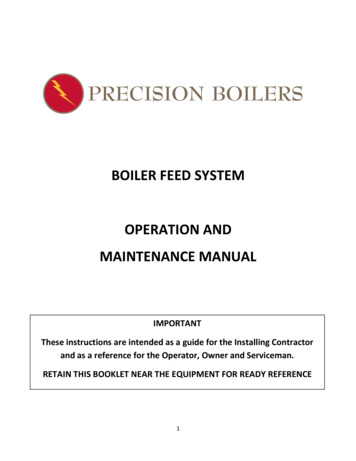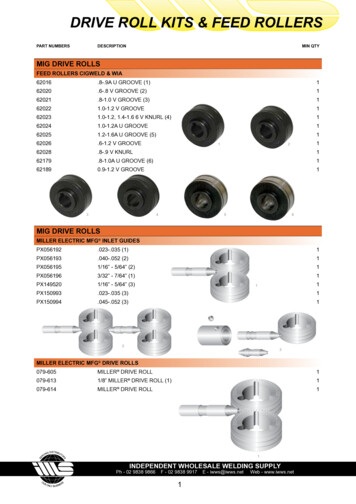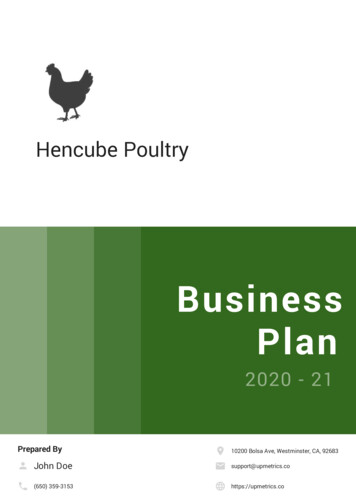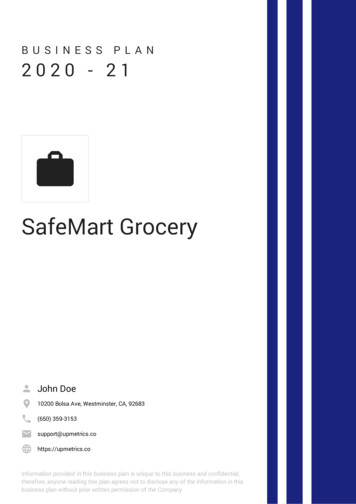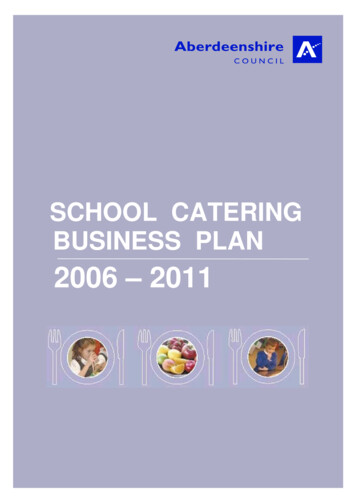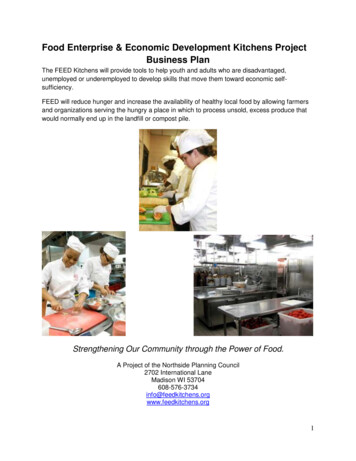
Transcription
Food Enterprise & Economic Development Kitchens ProjectBusiness PlanThe FEED Kitchens will provide tools to help youth and adults who are disadvantaged,unemployed or underemployed to develop skills that move them toward economic selfsufficiency.FEED will reduce hunger and increase the availability of healthy local food by allowing farmersand organizations serving the hungry a place in which to process unsold, excess produce thatwould normally end up in the landfill or compost pile.Strengthening Our Community through the Power of Food.A Project of the Northside Planning Council2702 International LaneMadison WI hens.org1
Table of ContentsExecutive Summary . 3Business Description and Vision . 4Definition of the Market . 4Description of the Services . 6Site, Organization and Management . 7Development of Policies & Procedures .8Marketing and Sales Strategy . 10Financial Management. 11Appendices . 132
Executive SummaryThe Food Enterprise and Economic Development (FEED) project is a social enterpriseformed to support small and start-up food entrepreneurs, provide a facility for customprocessing of value-added products for small farmers, and provide processing servicesto support the schools’ efforts to improve students’ nutrition. The goal is to increase theavailability of local, healthy and affordable food products and food-related employmentin Dane and adjacent counties. This Food Business Incubator will offer 5 commercialkitchen spaces for hourly rental, to enable a wide variety of food businesses to start andgrow. In addition to the kitchens, there will be on-site business planning & developmentclasses, plus financing assistance, offered by the Wisconsin Women's BusinessInitiative Corporation (WWBIC).Those food entrepreneurs seeking to start and grow a business will be encouraged tohave, or develop a business plan, and to create a plan to graduate from the FEEDIncubator into either a second-stage Incubator such as operated by CommonwealthDevelopment, Inc., or into their own independent facility. Other users will be long-termrenters, with no plans to move out of the FEED facility, operating part-time or very smallfood businesses.The users of these kitchens will be diverse; with many being low-to-moderate incomeindividuals who are seeking to either supplement their incomes, become economicallyself-sufficient, or to grow an already-existing small food business. Much of the earlycommunity interest has been by Hmong & Latino women who wish to sell traditionalfoods to raise money for themselves or community projects. Other users wish to explorethe development of a particular food product to see whether it has the potential tobecome the start of a new food business. All of them see the opportunity for increasedincome and new jobs for themselves and members of their communities.Committed users include:1. Caterers, food cart vendors, food product developers, food business start-ups, andculinary students at Madison College seeking to develop food businesses during andafter graduation.2. A food service training program and wholesale production business for returningprisoners and teenage children of incarcerated adults, unemployed and underemployedyouth and adults.3. The Farm to Table healthy snack program for school children in the Madison area.4. A State of Wisconsin grant-funded small farmer co-packing service to process excessproduce and from farmers and turn it into processed and value-added products that willbe sold to farmers’ wholesale and retail customers, increasing small farmers’ incomesand opportunities. This team will also provide prep and processing services to the3
Madison Public Schools for their salad bar lunch offering, as well as processing servicesto support the Southern WI Food Hub once it opens.One large kitchen will be designed for use by both training programs and cookingclasses, community cooking projects, food-related fundraising events, and foodprocessing demonstrations for Dane County’s Institutional Food Market project.Business Description and VisionThe Food Enterprise and Economic Development (FEED) Kitchens will be providingaffordable commercial kitchen space for rent, something that is currently not available inMadison or nearby communities. Similar food business incubators around the USgenerate 25 -35 new full time equivalent jobs per year as a result of the access tocommercial kitchen space that allows users to sell food products to the public. Based onother kitchen projects, and the findings of a feasibility study (May 2010), it is anticipatedthat the FEED project will be able to be self-sustaining by year three through user fees,provided that the kitchens open with long-term debt not to exceed approximately 1/3 thecost of the facility. Eventually the kitchens should be turning a small profit, which will bereinvested in other community economic development projects through its non-profitowner, the Northside Planning Council.The FEED project presents an opportunity for food entrepreneurs to explore thedevelopment of new food products and businesses, a way to increase the availability oflocal food through retail and wholesale outlets, a place where low-skill workers candevelop new skills to enable them to gain stable, long-term employment, and thedevelopment of new food-related jobs to help sustain individuals and families. It will alsoallow feature an in-house processing service to help local growers process excessproduce for later sale, the REAP Farm to Table snack program, which servesminimally-processed and packaged produce snacks to children throughout the Madisonschool system, and the Madison Public Schools’ new salad bar offering. Without acertified kitchen space, none of these endeavors will happen.Vision of the futureThe goal of FEED is to become a thriving food hub that will support a major increase inthe number of local foods and local food businesses in Dane County and beyond. Afterfive years of operation our goal is to have launched a variety of new food businessesand products into the greater Madison area, and see a concomitant increase in foodrelated employment and success. We anticipate that there will be a need for a secondkitchen facility in a different area of Madison within 10 years of FEED opening.Definition of the Market and PartnershipsThroughout the country and around Wisconsin, there is growing interest in kitchenincubators. Growth is driven by the changing economy as well as a growing community4
interest in having a greater connection to food, expressed as a part of the local foodmovement. Both the economy and the interest in more local food provide a solidfoundation for food entrepreneurship. The growth of the local food movement alone isso strong that the need for more food business opportunities is apparent.Wisconsin is currently a hotbed for local foods. The state boasts the nation’s largestproducer-only farmers’ market, over 200 local farmers' markets, over 100 restaurantsand food retailers marketing Wisconsin food products, and over 75 CommunitySupported Agriculture farms, which are not nearly enough to keep pace with demand.Despite strong interest, farms are still struggling to reach profitability and barriers tofood entrepreneurship exist. Small and medium sized farms are poised to provide theunique product offerings and the close food connections that consumers seek.However, for these farms to succeed, resources and processing space for farmers toreach profitable niche markets, expand their seasons, and add value to their rawproducts is critical. In addition to farms, the Madison area holds a number of buddingentrepreneurs interested in developing food businesses for catering, food carts, valueadded and specialty products, and seasonal or hobby businesses. The MadisonCollege Culinary Arts program graduates about 50 students each year, many of whomneed commercial kitchen space both while in school and upon graduation. For theseentrepreneurs, building a kitchen or investing in a full-time rental space is often costprohibitive. In addition, very few low cost, part-time commercial kitchens available forrent exist in the Madison area, and those that are available are at capacity or 75 milesfrom Madison proper.There is a strong push to make healthier food choices available through the publicschools, both through the snack program operate by REAP and available to thosereceiving free & reduced-cost lunches, and through a new salad bar offering forlunches. The schools no longer prepare their own food, and are relying on theavailability of the FEED Facility and the FEED processing team to provide preparationand processing for these two healthy food programs. Once FEED is open, REAP canconsider whether to grow their snack program to meet 100% of the need in the Madisonschool district, and the schools can begin to source local produce to include in theirsalad bars. There are also plans to begin offering dinners for low income students andeventually their families, funded by a unique partnership with local businesses andschools. These dinners will require production in a commercial kitchen space, and couldpartner with the food service training program and caterers using FEED, to provide thepreparation services that will be required for these dinners to meet the expecteddemand.FEED will be providing crucial processing services that will enable two new foodprojects to succeed: the Southern Wisconsin Food Hub and the Madison Public Market.The Food Hub has identified FEED as a critical partner, whereby FEED would provideprocessing and preservation services to the farmers using the Food Hub. This meansthe difference between food going to waste because it is not sold, and food processedinto value-added products to be stored and sold at a later date.5
The Madison Public Market has identified FEED as the place where new food productswill be developed and manufactured and small vendors will get critical business trainingand support so that they are able to open kiosk stands in the Public Market. A strongrelationship will develop between the coordinator of the Public Market and FEED, withthe hopes that niches will be identified and new vendors will be developed to fill thoseniches.The Madison area food community has had discussions about the need for acommercial food business incubator since 1997; however there was no organization orindividual community member able to lead the development of such a project. In 2008the Northside Planning Council (NPC) surveyed the community, and determined thatsuch a project would be one that the organization could develop, having successfullyled the development of projects such as Troy Gardens Community & Farm, the WarnerPark Community Recreation Center, and the Northside Farmers’ Market. Developing afood business incubator in the Madison area provides the space and the technicalresources needed for food businesses to reach the marketplace. With careful planningto insure that the needs of a wide variety of food entrepreneurs are met, as well asclose attention to the management needs of this complex enterprise, it is possible tomeet many of the food production needs of those individuals comprising small and startup food businesses.Description of the ServicesThe FEED kitchens will include five different types of kitchen spaces, each designed tomeet a specific production need. The following spaces will exist within the 5400 squarefoot building:1. A large training & community-use kitchen that will be able to accommodate groupsoffering food service training, cooking classes, and group food processing projects.2. Bakery kitchen able to support bakers wishing to produce large quantities of cookies,cakes, breads, rolls, and other baked goods.3. A large vegetable processing area for higher volume raw, canned and frozenvegetables and vegetable products. This kitchen will be used by the REAP Farm toTable school snack program, the FEED small farmer Co-packing and processingservice, and other food entrepreneurs seeking to process vegetables in quantities of upto 10,000 lbs. at a time. This kitchen and the FEED Processing service will also servethe City of Madison Public Schools Salad Bar offering, processing the products to beserved at the salad bars in the schools.4. A deli preparation area, allowing the packaging of prepared meats and vegetables forcatering and wholesale. This area will also serve as overflow processing space for theproduce kitchen.6
5. Meat processing kitchen which will include a meat grinder, sausage stuffer, meatpackaging and processing equipment. There is currently no rentable space for a meatproducer to work, so this will be offering a unique opportunity for those wishing toprocess a variety of meat products for sale within the state of Wisconsin. The space willbe configured to meet the USDA requirements (USDA certification is required for out-ofstate meat sales) should an entrepreneur wish to pursue a USDA meat processinglicense, but the kitchen itself will not be USDA certified unless there is sufficientdemand. The equipment for this kitchen will be added in late 2014.6. Dry, cold and frozen storage for rent, bulk buying opportunities, and a conferenceroom and office available for use by kitchen users and WWBIC. WWBIC will be offeringclasses in business planning, business finances and financing, loans, and mentoring.Madison College will develop specific fo
Business Plan The FEED Kitchens will provide tools to help youth and adults who are disadvantaged, . entrepreneurs interested in developing food businesses for catering, food carts, value added and specialty products, and seasonal or hobby businesses. The Madison College Culinary Arts program graduates about 50 students each year, many of whom need commercial kitchen space both
